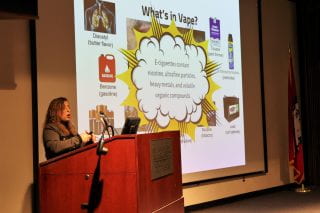New electronic cigarette products that include nicotine, THC, and other ingredients are infiltrating the market, including disposable e-cigarettes, e-cigarettes shaped like watches, highlighters, and other household products, and even “non-nicotine” e-cigarettes. Children, adolescents, and young adults are using these products more often than combustible cigarettes.
Stanford University Professor Bonnie Halpern-Felsher, NIH/NCI and FDA-funded researcher, focused on this topic during her presentation “Adolescent E-cigarette Use: What’s Going On and How to Prevent and Reduce Use” on January 23.
The lecture was the second in the college’s WE CARE Speaker Series featuring talks by prominent scholars with broad appeal across education and health.
Halpern-Felsher, creator of the Tobacco Prevention Toolkit, shared about various e-cigarette products, including nicotine levels, addiction, and other health effects, as well as the marketing around these products. She also shared several Stanford REACH Lab-created evidence-based curriculums and resources that can be used to help prevent and reduce the use of e-cigarettes.
“Dr. Halpern-Felsher’s curriculums are being used across the country to educate students of all ages about tobacco and cannabis products,” said Page Dobbs, associate professor of public health and co-director of the College of Education and Health Professions’ Center for Public Health and Technology. “Her work has been instrumental in creating policies at the local, state, and national levels that truly create change in behavior. It is an absolute honor to have her speak on our campus.”
Dean Kate Mamiseishvili noted that impactful research is one of the college’s key strategic plan priorities. The speaker series is among various strategies for promoting a culture of research excellence. “We’re excited to host conversations like these as we work together to promote innovative solutions in the caring professions,” she said.
In addition to the lecture, Halpern-Felsher participated in networking meetings with faculty and engaged with new faculty as part of the college’s Early-Career Faculty Research Engagement and Mentoring program.
Halpern-Felsher also provided curriculum training for local educators at the Northwest Arkansas Education Service Cooperative in Farmington.



